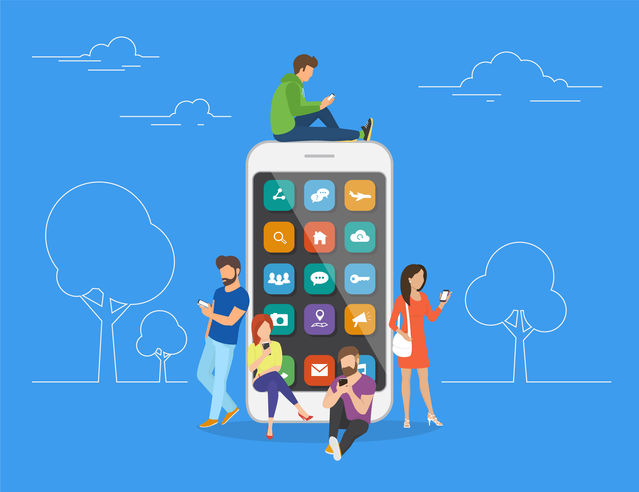Media
Social Media Could Be Harming Your Teen's Mental Health
The more time they spend online, the lonlier they feel.
Posted June 30, 2018

A lonely college student collects as many friends as he can on Instagram in hopes that they will increase the number of likes he gets when he posts. As empty as it may be, he feels a sense of validation each time someone acknowledges him online. A teenage girl spends hours on an anonymous chat site, hoping to find a sympathetic ear.
The recent deaths of Kate Spade and Anthony Bourdain have thrown a spotlight on the rising suicide rate in this country: according to the Center for Disease Control it is up 30 percent since 1999, and may be even higher for teens. Loneliness and depression are risk factors for depression. Consuming social media can make these feelings worse, and teens spend lots of time on social media. The vast majority (92 percent) report going online every day, 89 percent use at least one social media platform a day, and 24 percent of those surveyed say they are online “almost constantly.”
While correlation does not mean causation, there is no doubt that the technology and social media have changed the way our children relate to each other and feel about themselves. What is lost when a boy and girl, seated a few feet from each other text instead of talk? How about when girls on a school bus text jaunts about another girl, not behind her back but right next her? Is hanging out in one basement together gaming the same as playing a video game with each kid in a separate basement?
The Paradox of the Internet: The internet offers a 24/7 opportunity to connect to others, but at the expense of real human contact. Or as the writer, Jonathon Safran Foer, author of Extremely Loud, Incredibly Close wrote, "Technology celebrates connectedness, but encourages retreat… Each step 'forward' has made it easier, just a little, to avoid the emotional work of being present, to convey information rather than humanity."
Consider these findings:
- College students have surpassed the elderly as the loneliest segment of the population.
- 68 percent of Gen Z adults (ages 18 to 22) reported feeling shy and said the people around them neither knew them well nor were like them.
All the lonely people on the Internet: There is a growing body of research linking the consumption of social media to isolation and depression. A recent study by Dr. Ethan Kross at University of Michigan study found that the more time people spent on Facebook, the worse they felt. These findings replicated an earlier study by Dr. Brian Primack. His team at the University of Pittsburgh found that people who spent more than 2 hours a day consuming social media had twice the odds of perceived social isolation than those who said they spent a half hour per day or less on those sites. Worse, frequent users (58 visits per week) had more than three times the odds of perceived social isolation.
On a brighter note, researchers at Carnegie Melon University found that feelings of well-being increased when participants engaged directly with their friends on Facebook (tagging photos, liking posts). However, those who passively consumed Facebook felt worse. In another study, the same researcher directly demonstrated the internet paradox: the more time participants spent online, the less they communicated with family and friends in real life. This led to an increase in perceived isolation and depression.
If a tree fell in the woods and no one posts it...Today’s teenagers grow up in front of an audience. One young man told me if he went to the beach and did not send a Snapchat of it, his friends would not believe he went! However, this is about more than documenting one’s life: it’s about curating it. Teens feel constant pressure to show others they have friends, do interesting things, and look great. This is the best version of ourselves: “Brand Me.” Facebook, Instagram, and Snapchat reflect only our happy moments… our smiles, vacations, achievements. No one ever posts a picture of the test they failed, or the car they dented. This is another paradox of the internet: the illusion of connection. We present the best image of ourselves, and then feel terrible when we view the best image of our friends. As Steven Marche wrote in The Atlantic: "The passive consumption of other people's lives over social media—their idealized pictures of holidays, work, meals and family—seem to result in a more negative perception of our own lives and social interactions.”
FOMO: I have my own story of Facebook envy. Some years ago I was looking at my friend Jon’s Facebook post: a beautiful sunset over the ocean. As I read the caption: “the end of another great day on the Cape.” I thought, "Jon always takes the best vacations. I wish I took trips like that.” How ironic it was to feel this way—at that very minute I was standing on Cape Cod, just a few miles down the beach from Jon!
Presenting only an ideal self destroys what we need most to form deep human connections: vulnerability. How can we form authentic relationships if we are prevented from presenting an authentic self? How can we truly connect to each other’s humanness, to feel less alone, if all we see of the other person is a smiling selfie or picture of them having fun at a party? Constantly seeing pictures of what others are doing, and comparing these edited, idealized versions of reality to our own lives makes us feel even worse about ourselves than we already do. As they say in Alcoholics Anonymous, comparing our insides to someone else’s outsides never ends well. I don’t think, however, that it’s all about the Feeling of Missing Out. Social media can make us feel left out and left behind. We may log on to feel connection, but more often than not we log off feeling unloved.
How can you help your teen? Let’s be honest, they will outsmart any effort you make to limit their access to the internet or monitor their activity. More importantly, they grew up with social media and will continue to live with it. Beyond teaching them about safety, which is crucial, it is better to help them consume social media mindfully than try to stop them.
First, invite your teens to watch Poppie James’ TedX Talk “Addicted to Likes.” She has a lot to say about how social media draws us in and makes us feel. Jamie also offers a list of excellent suggestions to follow when going online. I will only share a few of the here, as a teaser:
1) Prepare to be connected to the world. It is an amazing thing if used wisely.
2) Everyone looks prettier, happier, and skinner. Don’t believe it.
3) Use it to be inspired and connected rather than to validate your life choices.
Now turn off your computer and talk to your kids. Ask what they thought of the Ted Talk. Show them this blog post. In case you need it, here is a list of questions that can guide your conversation:
1) How much time do you think the average teen spends online, specifically on social networking sites.
2) How does it feel when you see a post of people hanging out and you are not there?
3) Have you ever seen anyone post something about themselves that is unflattering, or does not present themselves in the best light?
4) Would you ever do that?
5) Have you ever seen someone post a picture that you knew exaggerated something?
6) What are the benefits of social media?
7) What are your most and least favorite apps and why?
8) If you could change two things about social media platforms what would they be?
9) Ask how they think kids who spend too much time online might connect to real people,
Then remind them of this quote from Theodore Roosevelt: “Comparison is the thief of joy.”
Thanks to Eric BelCastro for offering is insights about teens and social media.
References
Pew Research Center: https://www.pewinternet.org/2015/04/09/teens-social-media-technology-2015/ Teens, Social Media, & Technology Overview 2015
http://www.acha-ncha.org/docs/NCHA-II_SPRING_2017_REFERENCE_GROUP_EXECUTIVE_SUMMARY.pdf
as reported by Jane Brody; https://www.nytimes.com/2018/06/25/well/to-counter-loneliness-find-ways-to-connect.html
Brian A. Primack, MD, et. Al. "Social Media Use and Perceived Social Isolation Among Young Adults in the U.S." American Journal of Associative Medicine July 2017Volume 53, Issue 1, Pages 1–8




